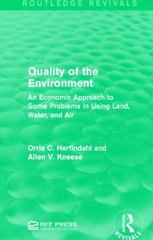Question
1) If a firm expects the price of the good it sells to rise in the future a) Quantity demanded for its product does not
1) If a firm expects the price of the good it sells to rise in the future
a) Quantity demanded for its product does not change b) Its supply curve shifts rightward c) It may reduce supply now, to save some of its inventory to sell later at the higher price d) Its quantity supplied changes, but its supply curve does not shift
2) what is likely to happen to the market for public transportation (an inferior good) if income increases
a) Equilibrium price will increase and equilibrium quantity will increase b) Equilibrium price will decrease and equilibrium quantity will increase c) Equilibrium price will increase and equilibrium quantity will decrease d)Equilibrium price will decrease and equilibrium quantity will decrease
3) economists consider normative statements to be
a) Descriptive making a claim about how the world is b) Statements which establish production goals for the economy c) Impossible to be proven to be true or false d) Able to predict how people will behave
4) if the price of a product is above the perfectly competitive market equilibrium price
a) Surplus of the product occurs b) Shortage of the product occurs c) Market never achieves equilibrium d) Excess demand of the product occurs
5) A drop in the price of pizzas shifts the demand curve for hamburgers inward. Thus these two goods must be
a) Complements b) Inferior goods c) Normal goods d) Substitutes
6) an economic model
a) Never takes into consideration governmen b) Does not have restive assumptions c) Has a full description of a situation d) Whose essential elements allow researchers to better analyze a situation
7) the opportunity cost of attending college is
a) The highest-valued alternatives use of the student s time b) The tuition the student pays c) The movie the student does not watch d) The value that the student attaches to not working
8) comparative advantage refers to
a) The one who always has an advantage over others b) To the fact that everyone does best when each concentrates on the activity with the lowest opportunity cost c) Absolute advantage d) The fact that one's opportunity cost in performing a task is higher than another's
Step by Step Solution
There are 3 Steps involved in it
Step: 1

Get Instant Access to Expert-Tailored Solutions
See step-by-step solutions with expert insights and AI powered tools for academic success
Step: 2

Step: 3

Ace Your Homework with AI
Get the answers you need in no time with our AI-driven, step-by-step assistance
Get Started


